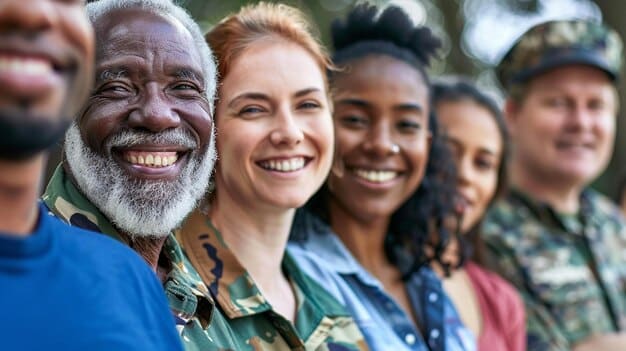Veteran Benefits Guide: Government Assistance & Resources for US Vets

Navigating the intricate landscape of government assistance for veterans can be complex, yet understanding available benefits, ranging from healthcare and education to housing and employment, is crucial for improving their quality of life and ensuring they receive the support they have earned through their service.
For those who have bravely served in the United States armed forces, a vast array of support mechanisms exist to aid in their transition and well-being after military service. This guide delves into the crucial specifics of Government Assistance for Veterans: A Guide to Benefits and Resources, aiming to demystify the process and highlight the expansive programs available to ensure our veterans receive the comprehensive care and opportunities they deserve.
Understanding the Pillars of Veteran Benefits
The foundation of government assistance for veterans rests upon several key pillars designed to address their diverse needs. From ensuring access to quality healthcare to providing educational and employment opportunities, these programs aim to facilitate a smooth transition to civilian life and support long-term well-being.
Healthcare Services: The VA Health System
One of the most critical aspects of veteran benefits is access to comprehensive healthcare through the Department of Veterans Affairs (VA) health system. This system provides a broad spectrum of medical services tailored to the unique health challenges veterans often face.
- Primary Care: Essential general health services, including routine check-ups and preventative care.
- Specialty Care: Access to specialists for conditions ranging from mental health issues like PTSD and depression to chronic pain management and rehabilitation services.
- Prescription Medications: Subsidized or free prescription drugs are available through the VA pharmacy system for enrolled veterans.
- Emergency Services: Access to emergency medical care through VA facilities or approved community providers.
Beyond traditional medical care, the VA also offers specialized programs for mental health, substance abuse treatment, and services for traumatic brain injury (TBI). The emphasis is on holistic care, recognizing the interconnectedness of physical and mental well-being for veterans.
Educational Opportunities: The GI Bill and Beyond
Education is a powerful tool for career transitioning and personal growth, and the government provides various programs to support veterans in pursuing higher education or vocational training. The most renowned of these is the GI Bill.
The Post-9/11 GI Bill, for instance, offers financial support for tuition, housing, and books for eligible veterans. It empowers them to enroll in colleges, universities, and vocational programs without the burden of significant educational debt. This benefit can be transferred to dependents under certain conditions, extending its impact to military families.
- Vocational Rehabilitation and Employment (VR&E): This program assists veterans with service-connected disabilities in preparing for, obtaining, and maintaining suitable employment.
- Tuition Assistance: While serving, active-duty personnel can use tuition assistance, which may later complement GI Bill benefits upon separation.
- Apprenticeships and On-the-Job Training: Opportunities to learn a trade or skill while earning a salary are also covered by GI Bill benefits, providing practical pathways to employment.
These educational pathways not only equip veterans with new skills but also foster personal development, helping them integrate into the civilian workforce with confidence and competence.
Financial Stability and Employment Support
Ensuring financial stability and securing meaningful employment are crucial steps for veterans returning to civilian life. The government offers a range of programs designed to assist with these vital aspects.
Disability Compensation and Pensions
Veterans who incur injuries or illnesses as a result of their military service may be eligible for disability compensation. This tax-free monetary benefit is paid to veterans who have a service-connected disability, providing a crucial safety net.
The amount of compensation depends on the severity of the disability, rated by the VA from 0% to 100%. Veterans with multiple disabilities may receive additional amounts based on combined ratings. Furthermore, certain special monthly compensation (SMC) rates exist for veterans with specific severe disabilities or combinations of disabilities.
For low-income wartime veterans, the VA also offers a pension program. Unlike disability compensation, VA pension benefits are needs-based and are designed for veterans who meet specific age or disability requirements, and whose income and net worth are below certain limits. This program includes Aid and Attendance or Housebound benefits for those who require assistance with daily living activities.
Employment Assistance Programs
Transitioning from military service to a civilian career can be challenging. Various government initiatives, often in partnership with private sector organizations, focus on connecting veterans with employment opportunities and providing job readiness support.
The Department of Labor (DOL) offers services through its Veterans’ Employment and Training Service (VETS), which provides resources for job searching, career counseling, and skills translation. Many states also have dedicated veteran employment representatives who can offer personalized assistance.
- Veterans’ Preference in Federal Hiring: Eligible veterans may receive preferential treatment in federal government employment, giving them an advantage in competitive hiring processes.
- Hiring Our Heroes Initiatives: Programs like those run by the U.S. Chamber of Commerce Foundation aim to connect veterans and military spouses with employment opportunities through career fairs and mentorship programs.
- Small Business Loans: The Small Business Administration (SBA) offers specialized loan programs, counseling, and training to veteran entrepreneurs looking to start or expand a business, recognizing their leadership and discipline skills.
These programs underscore the commitment to ensuring veterans have the tools and support needed to secure stable and rewarding careers, leveraging the unique skills and experiences gained during their service.

Housing and Home Ownership Support
Secure housing is a fundamental need, and the government offers significant support to veterans looking to purchase a home or requiring assistance with housing insecurity.
VA Home Loan Guarantee Program
Perhaps one of the most well-known and utilized benefits is the VA Home Loan Guarantee. This program helps veterans, service members, and eligible surviving spouses become homeowners. The VA does not lend money directly, but rather guarantees a portion of the loan, allowing private lenders to offer more favorable terms.
Key advantages of a VA loan include the ability to purchase a home with no down payment, competitive interest rates, no mortgage insurance requirements (which significantly reduces monthly payments), and limited closing costs. This program has enabled millions of veterans to achieve the dream of homeownership.
- No Down Payment: A significant advantage, as traditional loans often require a substantial down payment.
- No Mortgage Insurance: Unlike FHA or conventional loans, VA loans do not require private mortgage insurance (PMI) or mortgage insurance premiums (MIP), saving thousands over the life of the loan.
- Flexible Credit Requirements: While lenders still have credit standards, VA guidelines are often more forgiving than conventional loans.
The VA loan program is a testament to the nation’s commitment to providing tangible economic benefits for veterans, recognizing their sacrifice by making homeownership more accessible.
Homelessness Prevention and Assistance
Addressing veteran homelessness is a priority, and various programs are in place to provide immediate assistance and long-term solutions for veterans experiencing or at risk of homelessness.
The VA’s Homeless Programs Office leads the effort to end veteran homelessness. They offer a range of services from emergency housing to long-term support. Initiatives like the Housing and Urban Development-VA Supportive Housing (HUD-VASH) program combine HUD’s housing vouchers with VA’s supportive services to help homeless veterans and their families find and sustain permanent housing.
- Grant and Per Diem (GPD) Program: Provides grants to community-based agencies to offer transitional housing and supportive services to homeless veterans.
- Health Care for Homeless Veterans (HCHV): Offers outreach, clinical care, and case management to homeless veterans, linking them to appropriate treatment and housing.
- National Call Center for Homeless Veterans: A toll-free hotline and online resource available 24/7 for veterans who are homeless or at risk of homelessness, and their families.
These comprehensive efforts underline a holistic approach to veteran welfare, recognizing that stable housing is paramount for overall stability and reintegration into society.
Life Insurance and Survivor Benefits
Beyond direct support for veterans themselves, the government also provides crucial benefits to ensure the financial security of their families, particularly after a veteran’s passing.
VA Life Insurance Programs
The VA offers several life insurance programs designed to provide financial protection for service members and veterans, as well as their families. These programs often offer coverage at competitive rates, acknowledging the unique risks associated with military service.
Service members’ Group Life Insurance (SGLI) provides low-cost term life insurance to active-duty service members, ready reservists, members of the National Guard, and other specified groups. Upon separation from service, SGLI can be converted into Veterans’ Group Life Insurance (VGLI), allowing veterans to continue their coverage.
- Coverage Customization: Veterans can choose coverage amounts through VGLI that best suit their needs and financial situation.
- No Medical Exam (for initial conversion): Converting from SGLI to VGLI usually does not require a medical exam if done within a specific timeframe, making it accessible even for those with new health conditions.
- Total Disability Income Provision: Some policies may offer an accelerated payment if the insured becomes permanently and totally disabled.
These insurance options are a vital component of financial planning for veterans and their families, offering peace of mind and economic stability in uncertain times.
Survivor Benefits Programs
When a veteran passes away, their eligible survivors may be entitled to a range of benefits designed to help them cope with the loss and maintain financial stability. These programs acknowledge the sacrifices made by military families.
Dependency and Indemnity Compensation (DIC) is a tax-free monetary benefit paid to eligible survivors of military service members who died on active duty, or veterans whose death resulted from a service-related injury or disease. DIC also applies if a veteran had a 100% service-connected disability for a specified period prior to death.
Beyond DIC, other survivor benefits can include burial and funeral expense allowances, educational assistance for surviving spouses and children (through programs like the Fry Scholarship or Survivors’ and Dependents’ Educational Assistance), and VA-guaranteed home loans for eligible surviving spouses.
- Burial Benefits: Financial assistance for funeral and burial costs, and burial in national cemeteries.
- Health Care for Survivors: In some cases, surviving dependents may be eligible for healthcare benefits through CHAMPVA.
- Counseling and Support: The VA provides bereavement counseling and support services to help families navigate their grief and adjust to life after losing a veteran.
These survivor programs act as a crucial safety net, ensuring that the families who stood by their service members are not left unsupported after their ultimate sacrifice.
Adaptive and Specialized Resources
Recognizing that some veterans face unique challenges, specialized programs and adaptive resources are available to ensure they can live full and independent lives.
Adaptive Housing and Vehicle Grants
For veterans with certain severe service-connected disabilities, the VA offers grants to help them adapt their homes or vehicles to improve their mobility and independence. These grants are designed to cover significant costs associated with creating accessible living environments.
The Specially Adapted Housing (SAH) Grant and the Special Home Adaptation (SHA) Grant help veterans buy, build, or modify a home to meet their needs. These grants can fund things like wheelchair ramps, widened doorways, or accessible bathrooms. Similarly, the Automobile and Adaptive Equipment Grant helps eligible veterans purchase a new or used vehicle and adapt it with features such as power steering, power brakes, or lifts for wheelchairs.
- Enhanced Independence: These grants directly facilitate greater independence and quality of life for disabled veterans.
- Financial Alleviation: The grants significantly reduce the financial burden of necessary modifications, which can be substantial.
- Broad Coverage: They cover a range of adaptations, from structural home changes to specialized vehicle equipment.
These programs exemplify a deep commitment to ensuring that even severely disabled veterans can live comfortably and participate fully in their communities, free from unnecessary physical barriers.
Caregiver Support and Assistance
The role of caregivers for disabled veterans is invaluable, and the VA offers programs to support them, acknowledging their critical contribution to the veteran’s well-being.
The Program of Comprehensive Assistance for Family Caregivers (PCAFC) provides eligible caregivers of veterans with comprehensive support, including a monthly stipend, access to health insurance, caregiver training, mental health services, and respite care. This program significantly lightens the load for family caregivers, enabling them to provide the best possible care while also taking care of themselves.
- Financial Stipend: Provides crucial financial relief for caregivers who may have sacrificed their own careers.
- Healthcare Access: Opportunities for caregivers to access VA healthcare, ensuring their own health is maintained.
- Respite Care: Allows caregivers temporary relief, providing time for personal needs or rest.
Supporting caregivers is a recognition that the military family also serves, and their well-being is intrinsically linked to the veteran’s recovery and quality of life.

Additional Resources and Community Support
Beyond direct government benefits, a vast network of additional resources and community support organizations plays a crucial role in enhancing the lives of veterans.
Veteran Service Organizations (VSOs)
Veteran Service Organizations (VSOs) are non-profit groups dedicated to advocating for and assisting veterans. Organizations such as the American Legion, Veterans of Foreign Wars (VFW), Disabled American Veterans (DAV), and Paralyzed Veterans of America (PVA) provide invaluable services.
These VSOs often have accredited service officers who can help veterans navigate the complex VA claims process, ensuring they receive all entitled benefits. They also offer peer support, community events, and advocacy on Capitol Hill to influence policy that benefits veterans. Their collective voice is powerful in shaping legislation and defending veteran rights.
- Claims Assistance: Expert guidance on filing VA claims for disability, pension, and other benefits.
- Advocacy: Representing veteran interests at local, state, and federal levels.
- Community and Peer Support: Providing a sense of camaraderie and belonging among veterans.
VSOs are often the first point of contact for many veterans seeking assistance, providing a bridge between individual needs and governmental structures.
State and Local Veteran Programs
In addition to federal benefits, most U.S. states and many local communities offer their own unique programs and benefits for veterans. These can include state-specific property tax exemptions, tuition assistance at state universities, veteran preference in state employment, and specialized licenses or permits.
It is often beneficial for veterans to connect with their state’s Department of Veterans Affairs or equivalent office to understand the full scope of benefits available at the state level. Local veteran centers and county veteran service officers can also provide tailored information and assistance relevant to their specific areas.
- Property Tax Relief: Many states offer partial or full property tax exemptions for disabled veterans.
- State-specific Educational Benefits: Supplemental tuition waivers or scholarships for veterans attending state schools.
- Veteran Homes: State-run veteran homes offering nursing care, domiciliary care, and assisted living.
Exploring state and local resources can uncover additional layers of support that complement federal benefits, creating a more robust safety net for veterans and their families.
These diverse programs, from federal mandates to grassroots community efforts, collectively form a comprehensive ecosystem aimed at supporting veterans in every facet of their post-service lives. Understanding and accessing these resources is key to empowering them to thrive.
| Key Area | Brief Description |
|---|---|
| 🏥 Health & Wellness | Comprehensive healthcare services through the VA, including mental and physical health. |
| 🎓 Education & Training | GI Bill benefits for higher education, vocational training, and rehabilitation programs. |
| 🏡 Housing & Loans | VA Home Loan Guarantee with no down payment, and assistance for homeless veterans. |
| 💼 Employment & Income | Disability compensation, pension, job placement support, and small business aid. |
Frequently Asked Questions About Veteran Benefits
Generally, veterans who served in the active military, naval, or air service and were separated under any condition other than dishonorable may be eligible. Enrollment priority is given based on factors like service-connected disabilities, income levels, and other specific criteria. It’s best to apply to the VA to determine exact eligibility.
The Post-9/11 GI Bill provides financial support for education and housing to individuals with at least 90 days of aggregate service after September 10, 2001, or individuals discharged with a service-connected disability after 30 days. It covers tuition, housing allowances, and stipends for books and supplies, facilitating higher education and training.
Yes, in many cases, spouses and dependents can receive benefits. These may include educational assistance through programs like the Survivors’ and Dependents’ Educational Assistance (DEA) or the Fry Scholarship. Healthcare benefits like CHAMPVA, and Spina Bifida and Birth Defect benefits are also available for eligible family members of certain veterans.
The VA Home Loan is a mortgage option available to eligible service members, veterans, and surviving spouses. Its main advantages include no down payment requirement, no private mortgage insurance (PMI), competitive interest rates, and relaxed credit standards compared to conventional loans, making homeownership more accessible and affordable.
You can get assistance from several sources. The VA website (VA.gov) is a primary resource. Additionally, Veteran Service Organizations (VSOs) like the American Legion or VFW have accredited service officers who provide free, expert assistance with claims and understanding benefits. State and county veteran service offices also offer localized support.
Conclusion
Understanding the full spectrum of government assistance available to veterans is not merely an administrative task; it is a critical step in honoring their service and ensuring their well-being. From comprehensive healthcare and robust educational opportunities to vital housing support and financial assistance, these programs are designed to address the multifaceted needs of those who have sacrificed so much. By navigating these resources effectively, veterans and their families can access the support crucial for thriving in civilian life. The commitment to our veterans is a continuous endeavor, one that evolves as new challenges arise, but its core purpose remains steadfast: to provide the care, opportunities, and respect they unequivocally deserve.





